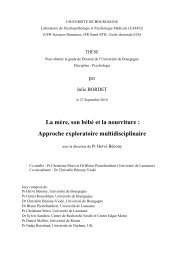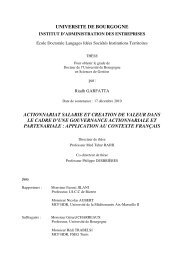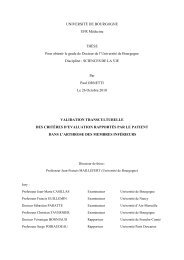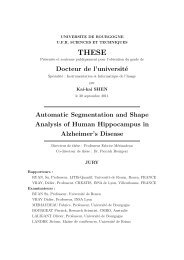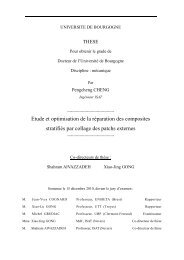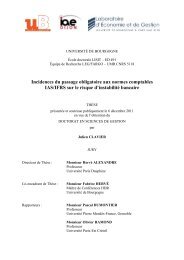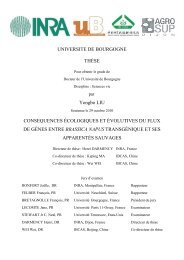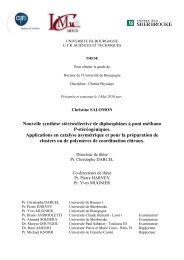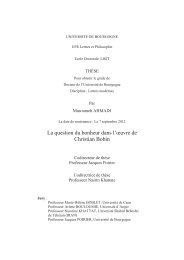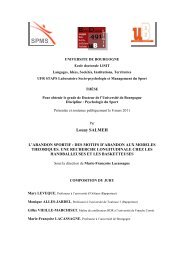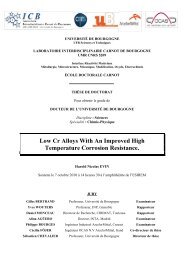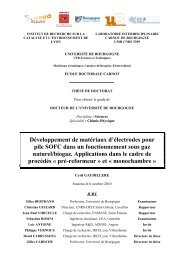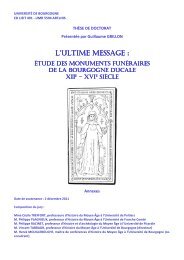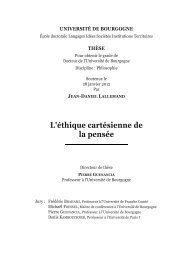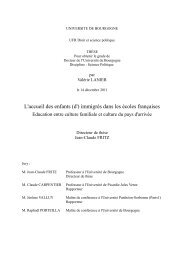le même processus pour tous - Université de Bourgogne
le même processus pour tous - Université de Bourgogne
le même processus pour tous - Université de Bourgogne
Create successful ePaper yourself
Turn your PDF publications into a flip-book with our unique Google optimized e-Paper software.
Chem. Percept. (2009) 2:143–153<br />
DOI 10.1007/s12078-009-9050-8<br />
Beer-Trained and Untrained Assessors Rely More on Vision<br />
than on Taste When They Categorize Beers<br />
Maud Lelièvre & Sylvie Chol<strong>le</strong>t & Hervé Abdi &<br />
Dominique Va<strong>le</strong>ntin<br />
Received: 20 April 2009 /Accepted: 9 July 2009 /Published online: 23 July 2009<br />
# 2009 Springer Science + Business Media, LLC<br />
Abstract What ro<strong>le</strong> categorization processes play in<br />
chemosensory expertise and its acquisition? In this paper,<br />
we address this question by exploring the criteria used by<br />
trained and untrained assessors when they categorize beers.<br />
Two experimental factors were manipulated: beer color and<br />
brewery. Participants sorted nine commercial beers coming<br />
in three different colors and from three different breweries.<br />
Participants sorted in two different conditions: in one<br />
condition, participants could see the beers, and in the other<br />
condition, they could not see the beers. We observed that in<br />
both tasting conditions (i.e., with or without vision), trained<br />
and untrained assessors categorized beers similarly. In the<br />
visual condition, assessors sorted beers by color, whereas in<br />
the blind condition, they sorted them by brewery. Overall, our<br />
results indicate that sensory training does not seem to have an<br />
effect on the criteria used to organize beer perceptions. This<br />
suggests that our trained beer assessors did not <strong>de</strong>velop<br />
specific conceptual representations of beers during training.<br />
Moreover, it seems that when assessors categorize<br />
beers, they rely more on visual than on chemosensory<br />
information.<br />
M. Lelièvre (*) : S. Chol<strong>le</strong>t<br />
Institut Supérieur d’Agriculture,<br />
48 Bou<strong>le</strong>vard Vauban,<br />
59046 Lil<strong>le</strong> Ce<strong>de</strong>x, France<br />
e-mail: m.<strong>de</strong>smas@isa-lil<strong>le</strong>.fr<br />
M. Lelièvre : D. Va<strong>le</strong>ntin<br />
UMR CSG 5170 CNRS, Inra, <strong>Université</strong> <strong>de</strong> <strong>Bourgogne</strong>,<br />
21000 Dijon, France<br />
H. Abdi<br />
The University of Texas at Dallas,<br />
Richardson, TX 75080-3021, USA<br />
Keywords Beer . Categorization . Expertise . Training .<br />
Visual Information<br />
Introduction<br />
Perfumers, oenologists, and beer experts possess an<br />
expertise that set them apart from other peop<strong>le</strong>, even<br />
perfume, wine, or beer lovers or aficionados. This professional<br />
expertise relies both on chemosensory and a<br />
technical know<strong>le</strong>dge. The chemosensory know<strong>le</strong>dge is<br />
acquired through repeated tastings and sniffings of beer,<br />
wine, or perfumes. The technical know<strong>le</strong>dge encompasses<br />
know<strong>le</strong>dge in chemistry, viticulture, oenology, brewing<br />
processes, etc. Un<strong>de</strong>rstanding expertise relative to chemical<br />
senses is a rather new field of research compared to<br />
un<strong>de</strong>rstanding expertise in other fields such as physics,<br />
prob<strong>le</strong>m solving, computer programming, games, sport, or<br />
medicine (for reviews, see Vicente and Wang 1998; Feldon<br />
2007). In the sensory field, the notion of expertise is also<br />
used, but with another <strong>de</strong>finition. Beer or wine experts in<br />
sensory evaluation are assessors trained to evaluate the<br />
intensity of different attributes of the products and to <strong>de</strong>tect<br />
and i<strong>de</strong>ntify flavors and <strong>de</strong>fects. Their expertise relies<br />
mainly on sensory expertise. For clarity, in this paper,<br />
professional experts will be cal<strong>le</strong>d “experts” and experts in<br />
sensory evaluation will be cal<strong>le</strong>d “trained assessors.”<br />
Chemosensory expertise has been relatively well studied<br />
in terms of discrimination, <strong>de</strong>scription, and, to a <strong>le</strong>sser<br />
extent, memory performance (see Chol<strong>le</strong>t and Va<strong>le</strong>ntin 2000,<br />
2006; Labbé et al. 2004; Va<strong>le</strong>ntin et al. 2007 for reviews).<br />
Overall, it seems that both experts and trained assessors are<br />
better than novices to <strong>de</strong>scribe, memorize, and discriminate<br />
between stimuli, but the difference in performance is not<br />
always very impressive.



